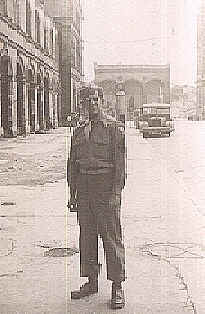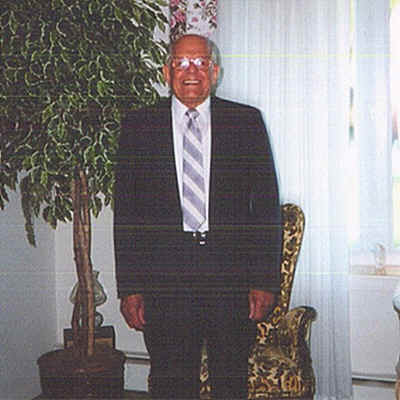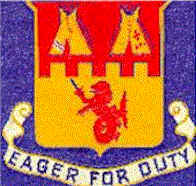Three
Pictures of Albert R. Panebianco


Anzio 1944
Munich 1945

Springfield, Pennsylvania 1998

This picture was mailed to my mother January 28th,
1945 by our Chaplin Father Joseph D. Barry. On his left is General Charles Ankorn who was
the 157th Regimental Commander (then a colonel). Captain Father Joseph D. Barry was
awarded the Silver Star for bravery. After 54 years, I can still see Father Barry
administering last rights to soldiers in the field while enemy shells exploded all around
him. He was a dedicated priest and I will never forget him.
On September 24th, 1943, a jeep carrying Colonel
Charles Ankorn struck a mine near the front lines. Neither the driver or his bodyguard was
seriously injured but Colonel Ankorn's right leg was mangled and had to be amputated. He
was sadly missed, for more than any other man he had built up the fighting qualities of
the 157th.

Father Barry holding mass on Anzio in 1944


"Going Home" On the S.S. Marine Devil.
Left to Right - Father Barry, Lt. Bob LeMense,
Co. "L", 157th, Lt. (SG) Paul Rice - Communications Officer S.S. Marine Devil.
(All 3 were graduates of Notre Dame) Lt. Don Mihan, CIC 20th corp - (before WWII, had been
business manager of "Fibber McGee and Molly") This picture taken about
9/6/45
Mid-Atlantic.

The new Thunderbird Ticket that replaced the old
TS slip.

THE HOFBRAUHAUS – MUNICH, GERMANY
CP 157TH INF, 45TH
DIVISION 1945
This is a picture of the Hofbrauhaus in Munich,
Germany where one Adolph Hitler led his gang of bullies in his first abortive attempt to
unseat organized government by violence. His Putsch from this beer hall was a dismal
failure and ended with Der Fuerher flat on his face dodging bullets a few blocks from the
spot where he declared to his followers that he would win or die. On April 30, 1945,
Munich fell before elements of the 45th and 42nd divisions. The 157th
Infantry won the race for the Hofbrauhaus and their CP sign was the first to be placed on
it. This caption was taken from the 157th Book, Eager for Duty. Picture was
taken from the Forty Fifth Division Book.
Al Panebianco
K/157/45


George and Lois Strauch
Since George was the only one who could speak
German, he acted as the interpreter and negotiator in the surrender of our troops at
Reipertswiller. George was seriously wounded and credits a German surgeon for saving his
life.

Bob
Vorphal Ken Garrett
Bob and I shared the same foxholes from 8/15/44 to
1/15/45. I was hit on 1/15/45 and Bob was taken prisoner on 1/20/45.
Ken was a platoon sergeant Co. "K" and was
taken prisoner 1/20/45.

Harry
Fryer
James King
Harry was a machine gunner with Co "K",
157th. He was seriously wounded at Reipertswiller. His left arm was riddled by German
machine gun fire and had to be amputated.
James King was a member of Co. "M", a
heavymachine gunner attached to Co. "L". Jim who was a corporal became squad
leader, platoon sergeant, and since there was no officer, he was also the platoon leader.
He took control and moved his men forward. Jim was taken prisoner at Reipertswiller on
1/20/45.
This railway artillery piece is on display at the
Aberdeen Proving Ground in Aberdeen, Maryland. Picture and caption is taken from the
Aberdeen Proving Ground brochure.

THE LEOPOLD RAILWAY CANNON
It is hard to imagine that the Germans could conceal
a weapon capable of firing a
550-pound shell. The German Leopold Gun was the largest weapon which lobbed shells at
American troops at "Anzio Beach". An aura of mystery surrounded the employment
of the gun. To the bewilderment of allied officials who knew the approximate location of
the Leopold, the gun could not be silenced. Repeated bomber and naval attacks failed. It
wasn't until the Allies broke out of the "Anzio Beachhead" and sent the Germans
scurrying that the secret was revealed. The Leopold supported by 24 railcar wheels, was
mounted on railroad tracks which led in and out of mountain tunnels. When not firing, the
gun was rolled back into the tunnels out of the sight of Allied reconnaissance. Because
bombs had destroyed Italian rail systems, the Germans were forced to leave the
Leopold and its twin gun "Robert" behind. Although both guns had been
extensively damaged, Allied forces were able to salvage the Leopold and after
reconstruction of the railway, moved the gun to Naples for shipment to the United
States. "Anzio Annie" as the gun was known to the Allied troops at Anzio, is the
only German railroad gun known to have survived World War II.

"Hope you get as big a laugh out of this as I
did. You and Bob appear to be real serious. A sixty mm is what got me at Reipertswiller
January 18, 1945. Your good ole' buddy, way down south in Florida."
Kenneth Garrett


Please refer to the CMOH page.

Jim Bird served with "A" Battery, 160th FA Bn. attached
to the 45th Infantry Division. He participated in 8 campaigns with over 500+ days of
combat. He was the recipient of the Silver Star, 2 Purple Hearts, The ETO Medal, German
Occupational Medal, etc.
Henry Kaufman served in "H" Company, Second Bn., 157th
Regiment, 45th Infantry Division. He was taken prisoner on Anzio Beachhead and spent 15
months in various POW camps, and five days at Camp Dachau.
This picture taken at the 157th Regiment Reunion in Philadelphia,
Sept. - 2000.

Douglas Hickling (left), son of Jessica Hickling.
Vere (Tarzan) Williams (right), was a member of Company
"K", 157th Regiment, 45th Infantry Division. He joined the National Guard
in the Fall of 1938, mobilized in the regular army, Sept. 1940, went through 6 training
camps. He then shipped out of Newport News, Virginia for Oran, North Africa.
First saw action in Sicily, Italy and France, and almost reached Germany. He
received 6 campaign battle stars, was wounded six times, and was the recipient of the
"Silver Star", awarded for bravery. Flint Whitlock, author of "The
Rock of Anzio", begins the first page of his book with experiences of Vere (Tarzan)
Williams.


James
“Bud” Burns
Italy, July 4, 1944
During World War II, James Burns
was a member of the 180th Regiment, 45th Infantry Division. While on
Anzio he met Alva “Al” Bacon. They became the best of friends and endured the
war until its end. They were in communications and carried large field radios on their
backs. Field radio men were very important to successful infantry operations
After the war, Sergeant Bacon and
Corporal Burns returned home and went about raising their families. Bacon was very
successful in the private sector and eventually retired. He now makes his home in upper
Michigan. Burns joined the U.S. Border Patrol and died in December 1968 having suffered a
heart attack while on duty.
James Burns Jr. has
written a book, “Friends at Anzio”, stories of Bacon and Burns, 180th
Infantry, 45th Division. Anyone interested in purchasing this book, please
contact James Burns Jr. by email, rjburns@mindspring.com. The book
makes for interesting reading and tells of many horror and humorous stories of these two
men during the war.

HOME
|






















